Stepping up to sustain Vagahau Niue
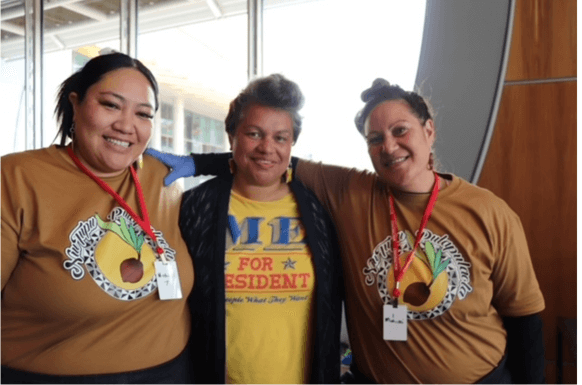
It is vital that we preserve, sustain and maintain Vagahau Niue and culture for many generations to come. Niue leaders and community groups are working hard to explore, discuss and formulate strategies to ensure that the Vagahau Niue and culture are protected and sustained for future generations.
Vagahau Niue has been registered with UNESCO as an endangered language, so one of the challenges is the preservation of Vagahau Niue and Niue culture.
Our theme this year for Niue Language Week here in Aotearoa New Zealand is “Fakatūleva e vagahau Niue mo e tau aga fakamotu mae tau atuhau”
which means
“Sustain Niue language and culture for future generations.”
More than 30,000 Niueans now call New Zealand home, about 23,000 in Auckland and almost 2,000 in Wellington. For our Niue community in Wellington, we are grateful to the pioneers and our tupuna who have carried our taoga from Niue to settle in Aotearoa. They had to adapt to a new way of life that was not simple and assimilating to a westernized society often meant that in some spaces we had to leave our language and culture behind. As more of our people grow up as the diaspora, far from Niue, there is a greater need to maintain and sustain our ties back to our homeland.
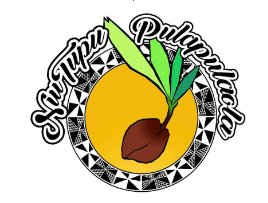
Niutupu Pulapulaola was established on the basis of providing opportunities to connect tagata Niue to their cultural heritage. The ‘niutupu’ or germinating coconut represents growth and ‘pulapulaola’ refers to the young generation. Our vision is to create pathways where our young Niueans are able to grow and thrive in their culture and everything that makes them tagata Niue.
In this blog we feature two of the co-leaders from Niutupu Pulapulaola who are passionate about connecting generations to their language and culture through arts and crafts.
Margaret Jackson and Maryanne Lapana are the shared leads for Niutupu Pulapulaola, Committee members on Wellington Niue Rugby League and also part of the Niue Wellington Covid-19 action group. They share their story with us and the passion that drives them to thrive as atuhau pulapulaola of Niue.
Fakaalofa Atu kia mutolu oti
Koe higoa haaaku ko Maryanne Lapana
Hau au e tau maaga fulufuluola ko Liku, Tamakautoga, Hakupu, Tuapa, Alofi mo Avatele
Koe haaku matua fifine ko Viola Lapana
Koe haaku matua taane ko Tula Lapana
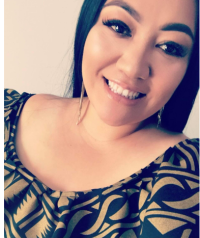
I am a NZ born Niuean, raised in Cannons Creek, Porirua. My parents and grandparents spent their lives growing up on the beautiful soil of Niue. My mum spent her childhood in Tamakautoga, Niue and my dad spent his childhood in Liku, Niue. My grandpa came to NZ first to set up for my Nena and his children (mum, aunties & uncles) at the time wanting better life opportunities for them.
I’ve never been to Niue, however hearing the stories from my family takes me there, definitely a place I want to connect with. For my family growing up in Niue was always full of life - growing Taro, futi ika (fishing), umu, learning authentic Niue cuisine, fekau, lologo, koli, church that instilled the values, beliefs and traditions of Niue.
For me, sustaining the Niuean language and culture in Aotearoa comes from my magafaoa - my family. They have been leaders of many community and cultural groups as well as church events. Their examples have demonstrated ways for me to develop my knowledge of culture and vagahau. Listening to conversations, replying back in Vagahau Niue and having my family support and guide my conversations has really increased my confidence, and as a family, our reading of the Bible has helped my pronunciation and familiarity with the vocabulary.
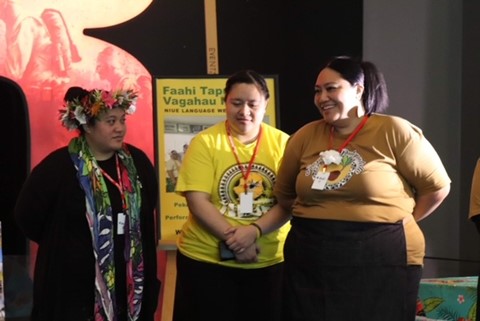
There is a responsibility on myself as well to continue learning and developing our beautiful language and culture. Not only for myself personally but through my teaching practice as a qualified and registered early childhood faiaoga. Children have also become my teacher.
It is important to sustain the culture for future generations to come because it is who I am, this is my identity, my culture, my language, my blood - 683 all day! I carry my family in all walks of life, and the knowledge that in NZ our language is becoming extinct saddens me and I refuse to go down like that, so I am doing whatever I can to sustain Vagahau Niue in all I do.
For Niuean’s wanting to learn the language - do it! Our culture is phenomenal.
Don’t let anyone tell you that you can’t, this is your story, your learning journey. I guess in some way Niutupu Pulapulaola was built for that purpose as well, to create a safe space for all our Tagata Niue to participate wherever they are in their Niue journey. We welcome everyone.
Monu Monu Monu Tagaloa !
Fakaalofa Hofihofi atu kia Tautolu oti
Koe Higoa haaku ko Margaret Eliza Jackson
Nofo au I Taita, Lower Hutt
Hau a au he tau maaga fulufuluola ko Fineone Hakupu Atua, Tamahaleleka Liku, Uhomotu Tuapa mo Aliutu Alofi Toga
Ko e tau mamatua Tupuna haaku ko Robert Richmond Jackson mo Eliza Minnie Head,
Faahi matua Taane
Koe tau mamatua Tupuna haaku ko Ikihagai Hunuki Mo Feuaki Togia Fakaasikau Hunuki
Faahi matua Fifine
Koe Matua Taane haaku ko Murray Owen Jackson
Koe Matua Fifine haaku ko Tolitagaloa Hunuki Jackson
Toko fitu a mautolu he katoa
Toko fa e tama taane
Toko tolu e tama fifine
Ko au e fakahiku he mahaga fifine
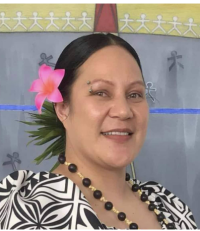
I am New Zealand Niuean, born and raised in Lower Hutt. Both of my parents were born on the beautiful island, known as the Rock of Polynesia, NIUE!
My father left Niue in April 1953. My mother left Niue in December 1965 by a boat called Tofuā, and sailed to New Zealand. They decided to leave their homeland for a better life.
Life was very hard for both my parents growing up in Niue. They both came from large families and had to learn & adapt at a young age to provide food for their family. Fishing, working the plantation, and hunting for crabs played a big role in their lives growing up.
Before and after school they had to make sure the chickens were fed. Every Saturday they would go fishing, or into the bush to get food from their plantation to prepare & cook in the umu for Sunday lunch after church.
Growing up in Aotearoa as a NZ born Niuean it was hard for me and my siblings to learn and understand vagahau Niue. My parents spoke very little of their mother tongue around us. As we got older, we found other avenues to learn about our culture and language.
It was then my journey started. Determined more than ever to learn, embrace and be proud of being a Niuean. Taking part in lologos (songs), small conversations, Niuean arts and craft activities, dance and other cultural activities, gave me more confidence within myself.
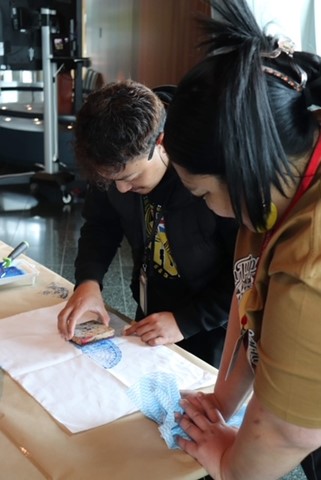
I have completed a Vagahau Niue language class online and strongly encouraged my siblings, nieces and nephews to do the same. They were greatly appreciative, and thankful for the encouragement I gave them to take part in learning our language online. They found it very beneficial and have become more confident in themselves since they enrolled into these classes.
I think it is very important for us as NZ born Niuean's to have support and encouragement from our Matua’s, to uplift and embrace who we are as Tagata Niue.
It is never too late to learn, if we surround ourselves with positive thoughts, and encouragement, and know we are not alone.
Fakaaue lahi mahaki
Oue Tulou Ko e Naia
Feel free to connect with us as we find ways to embrace our Niue culture and identity. Join us on Niutupu Pulapulaola.
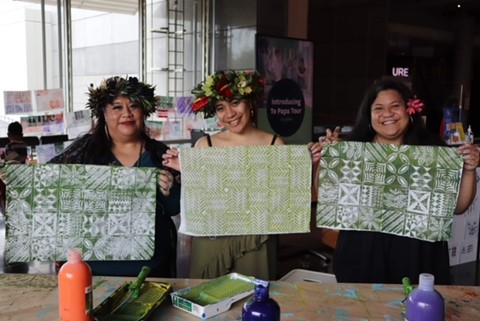
The information on this site has been gathered from our content partners.
The names, terms, and labels that we present on the site may contain images or voices of deceased persons and may also reflect the bias, norms, and perspective of the period of time in which they were created. We accept that these may not be appropriate today.
If you have any concerns or questions about an item, please contact us.